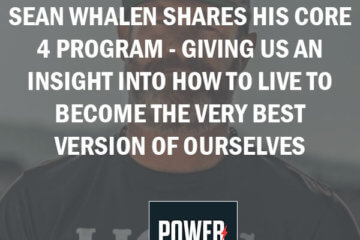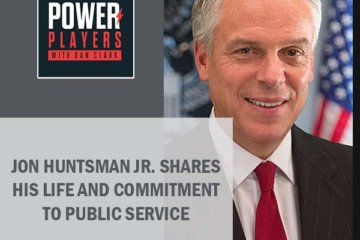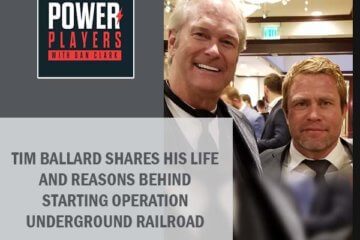Listen to the podcast here:
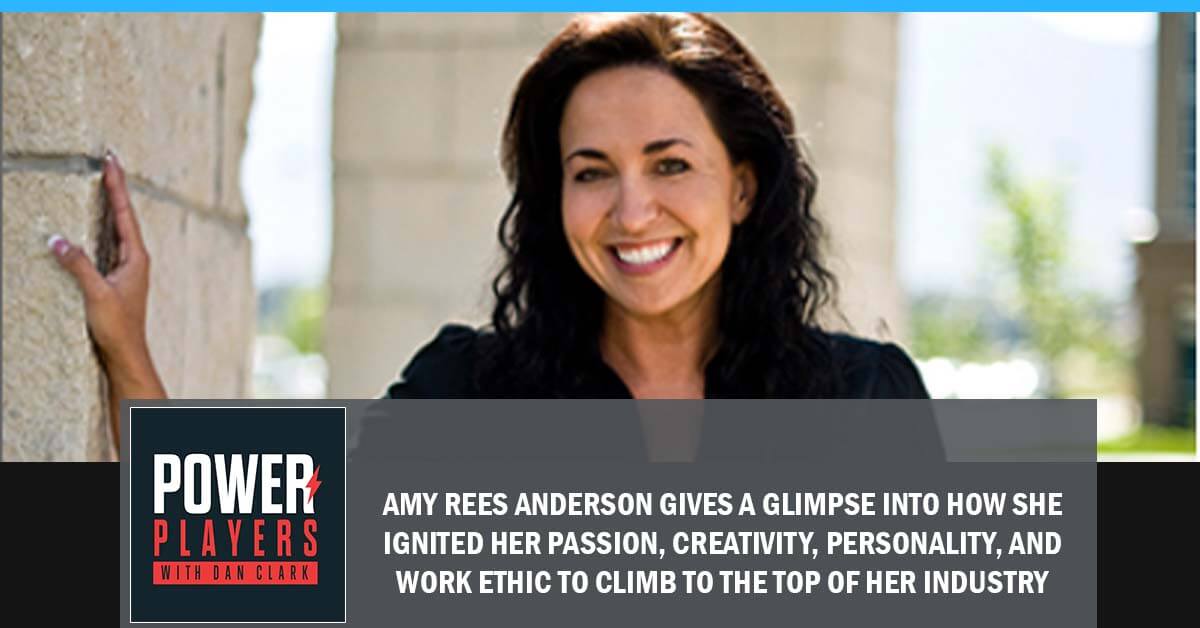
Ignite your passion, creativity, personality and work ethic and claim success! In this episode, Dan Clark interviews successful entrepreneur, public speaker, angel investor, author, and philanthropist Amy Rees Anderson. Amy is the owner and Founder of REES Capital and the Founder of MediConnect Global Inc. Amy and Dan discuss how Amy built success in a traditionally male-dominated field and how the life lessons she learned helped fuel her drive to the top. Tune in and be inspired by Amy’s story today.
—
Amy Rees Anderson Gives A Glimpse Into How She Ignited Her Passion, Creativity, Personality, And Work Ethic To Climb To The Top Of Her Industry
This is an interview with entrepreneur, businesswoman, and philanthropist Amy Rees Anderson. In this episode, Amy who founded her company, REEs Capital, and sold it for over $350 million, shares her life and climb to the top of the industry. She is giving us an inside glimpse of how she ignited her passion, creativity, personality, and work ethic to innovate in such a unique way that allowed her to build her amazing company into an organization worth buying.
—
I can’t wait to dive deeper into who you are, what you ared investigate these three Ps that I have identified that make people power players. Are you ready to play?
I’m ready.
When and how did you first identify your passion for high-tech and making a difference with scaling your knowledge, your inspiration and your education? Talk to us about how you found this unique passion, especially as a woman in a so-called man’s world.
If you learn, you never lose.
I don’t know that I started with this passion for technology. It was that I had a passion for trying to support my two kids. I was a single mom with two little kids. I had dropped out of college and was trying to figure out how do I support this family on my own. It’s because I had experiences in healthcare and I had worked in healthcare as a young girl in high school, and then out of college. It was a field that I had this background of knowledge.
It became a passion because I think the more you do something and the more you do it well, the more passionate you become. The passion was to put food on the table. That was the goal but I found that I had this good talent for seeing a piece of software and knowing what it should look like and how it should function. I learned how to design that, and that led me to get into the healthcare technology industry.
Teach us about what MediConnect really is and how come it scaled so quickly. How were you able to expand it so amazingly?
MediConnect Global was a health information exchange, which means our job was to go out and get medical data from where it existed, whether it’s pharmacies, medical offices or hospitals. You name it. We would go and gather all the medical data in whatever format it came in, transpose it into an actual electronic database, and then run analytics across it for everyone from life insurance companies, lawyers, health insurance companies, and eventually, to consumers. That was a company that we grew and sold in 2012.

Work Ethic: You can teach people a skill, but it’s hard to teach somebody a value when trying to run a company and grow it.
How did you grow it? Did you find the right people whom you caught up in recruiting? Did you find at an early age the art of attraction? How did you find the right people to work in your passion that shared your passion?
I think initially, by making a lot of mistakes. You initially go into hiring, and you think, “I’m going to hire for people’s skills,” and then you start to learn that it’s more important to hire them for their values because you can teach people a skill but it’s hard to teach somebody a value when you are trying to run a company and grow it. I learned to more of my focus on who I went out and recruited. I went and looked for people that were hard-working, that had integrity, that was trustworthy, and that would go the extra mile for people because if you find somebody like that, you are going to have a home run as a company no matter what you are doing.
I was blessed to be surrounded by a team of incredible people that the more I helped them to succeed, the more they wanted to help me succeed, and the more I was willing to be vulnerable and open as a leader and say, “I don’t have this all figured out. I’m trying to learn as I go here. Can you guys help me?” The more people wanted to get on board and help me succeed, which was counterintuitive because most leaders have this pressure to feel like, “I have to know everything. I have to be perfect. I have to be the person that’s the smartest in the room.”
When I was young, I started that way, and I learned that is not the right approach because nobody wants to help you if you are a know-it-all. Nobody is excited to give you input, advice or attention if you are a know-it-all. There’s no value in that, so I learned how to stop trying to be a know-it-all and then become the person that says, “I’m stressed. I’m scared. This is hard for me but I’m trying to do the right things here. Help me to succeed,” and people got behind me and helped me do that.
It’s on our own shoulders to connect with others, not to wait for other people to reach out to us.
Unfortunately, we are not videotaping this show because I want the world to see how flawless you are. You are beautiful, drop-dead gorgeous, and beautiful inside and out, which this episode will reveal but people in an audience would look at you and say, “You don’t get me. You have never failed. You have never even had a zit. You have never had your heart broken. Talk to me. I can’t relate,” and perhaps, the story is a lot different than that. That with your beautiful smile, you can smile away the pain but please teach us what you did when you fell down.
How did you respond with two kids? Don’t blaze over that and say, “My passion was I had to feed my kids, so I started this company.” Let’s go back for a moment and talk about what prepared you to start this company, which allows you to segue into the third P. It is pursuing that passion regardless of what happens to the economy and anything that happens in your life.
First of all, thank you. Those are very kind words. You made my whole day. My whole month, frankly. I have all of those things. Failure and heartbreak, all of those things have happened in my life. Growing up, I moved a lot. My dad was originally an FBI. We moved from Oregon, Washington, Michigan, Virginia, Tennessee, Texas and California. We moved all over the country. I think by moving so much, you have to learn how to start over again because you are moving. I went to four different high schools, for example, and as a kid, you can imagine how hard that is.
For me, it was learning to make friends again, start over, and be the new kid. It wasn’t easy. That was a hard challenge. I had to learn that you had to be willing to be kind, friendly, and open with people and that it was on our own shoulders to connect with others, and not to wait for other people to reach out to us. Where I hated having to move as a kid, as an adult I’m so grateful for that. That’s often the case. We learn some of our most valuable lessons from some of the hardest trials we have. I’m not saying that moving was the hardest trial. I’m saying that that’s the thing that teaches you these skills that you end up using later in life, and you look back and go, “That’s why I had to go through that.”
I was only seventeen years old when I came out to go to BYU. It was the first time I had ever been away from my parents. My dad and mom dropped me off, and my dad handed me a checking account. It’s the first time in my life I had ever had a checkbook even. I had grown up working in jobs since I was young but my parents always took care of a lot of that stuff for me, so here I was, bouncing many checks.
In my freshman year of college, they had to fly my dad out to meet with the bank president because I wasn’t eighteen. If there was paper in the checkbook, I was like, “This is awesome. I will sign this away and hand it to someone. I can go buy shopping stuff.” It was great. It wasn’t intentional by any means, but that tells you where I was at. I was this seventeen-year-old girl in college that was clueless about a lot of things.
I grew up with this mom with ten kids that was a stay-at-home mom, and that was my goal. When I came out to college, I didn’t come out thinking, “I’m going to go into business or get a degree.” I came out and thought, “I’m going to get married to some gorgeous guy and have a big, huge family and be a stay-at-home mom.” That was where I started from, and I did. I came out, and I’ve got married young. I had two little kids and then I ended up divorced. It was not the game plan. You don’t go into life thinking, “This is the plan.”
What I learned from all these different heartbreaks I went through was you can sit there, cry, fall apart about it, and be miserable with life but it doesn’t change anything. Your circumstances are what they are, so your choice is to fall apart and stay where you are or to get up and get moving, and I luckily had been raised to believe that the goal is to always be moving forward, so for me, it was like, “What do I do next?”

Work Ethic: We don’t attract enough young women into that field today, which is a shame because it’s a talent that they naturally gravitate toward.
Someone gave me this awesome little poster that has been on my wall my whole life that says, “Everything will be okay in the end. If it’s not okay, it’s not the end,” and that, for me, was the thing to say, “Life might suck today but tomorrow, it’s going to be whatever I make it.” I had been one of those people that believed that you keep getting up and trying again.
You asked about failures. To me, I failed one million times in what the world would maybe say is a failure but in my brain, it wasn’t a failure because if I learned something that made me smarter the next time and I wouldn’t repeat that same mistake again, then I would consider it a mistake or a screw-up but it wasn’t a failure. I defined it differently in my head, and that allowed me to try a whole bunch of things that I think otherwise would have been afraid to try because so many people are afraid to fail. They are afraid of embarrassment and what other people think.
When you go from this situation where nothing in your life is the picture you would have painted, and you have to make something of it, you go, “I have to quit worrying about what other people think.” I didn’t fit any of the stereotypes. I was this young girl in a technology world and didn’t even realize that women weren’t in tech back then until I was at a trade show down in Vegas. It was the COMDEX trade show. I’m walking the floor, and I’m the only woman in this conference that was hired to work in the booths. I was like, “Do women not do technology?”
It was this duh moment for me. I didn’t know, and I guess in a way, it was good I was naive because it didn’t hold me back. I never thought of there being a glass ceiling. I never thought of the fact that you should think of yourself as disadvantaged because you are a woman in business. I credit my parents for raising me, especially a strong father that never acted like I should think I was less, so I didn’t. That courage gave me a platform to plow ahead and not be so worried about what other people thought or if I was going to make a mistake, it let me go, “As long as I grow from it, that’s okay.”
What you taught the world is that if you learn, you never lose.
Don’t make the same mistake twice because that’s dumb. Make a bunch of them once. That’s fine.
One of my favorite quotes that recur in a show-after-show is that pain is a signal to grow, not to suffer. Once you learn the lesson, the pain teaches you. The pain goes away, so in life, there are no mistakes, only lessons. I have told you this a couple of times in different galas and events that you and I have attended. As a professional speaker in the Hall of Fame, I have discovered that a man can be a role model only to a man but a woman can be a role model to both a man and a woman because you can get men to do things that other men can’t get us to do. The question is, who in your past inspired you to believe that you could start your own business as a woman in a glass ceiling man’s world but you didn’t acknowledge, and still exists in the minds of so many other women?
Everyone says, “You must be really risky because you were an entrepreneur.” I was risk-averse but what’s true of most entrepreneurs it’s in their brain. They think that they are less of a risk to bank on themselves than to bank on somebody else. I was working in these jobs in healthcare, and I had this knowledge of the industry, and one day, someone came in to sell software to the office I was running. I remember thinking, “I could do that,” and then as I started to understand the technology world and learn software, I started drawing pictures of things of what software should look like.
It’s an area where I think we need so many more women in that field, because for men, when it comes to designing systems, they think function. “If I push a button, does it do as it is supposed to do?” For a woman, we think, “How did it feel when I pushed that button? Was it a good experience or a bad experience? That I had to click this button to get to that button?” As a woman, it helped me think about the user experience or feeling. It gives women a little bit of an edge when it comes to designing, and yet, we don’t attract enough young women into that field, which is a shame because it’s a talent that they naturally gravitate toward.
I didn’t set out to design my own software. I was originally selling someone else’s software with my own company, and it was because of what you could find as a failure. We had a deal cut with the parent company that we were going to take over developing their software. They would still own it but I was going to take over designing.
If we need to, we can all get jobs doing something. We can live and survive. Let’s just try.
They, in the end, would have owned all the intellectual property but for me, that was like, “That’s okay. I don’t care. I just want it to look a certain way,” and right before we were supposed to go and ink that deal, their company had merged with another company, and the FBI had come in and taken their office over. There had been some falsification they had done in this big public-traded deal, and my deal blew up.
I was getting in that office to sign a contract with somebody. I remember gathering the employees together, and we all looked at each other. I hired everybody and was teed up for this development project, and now, there was no money coming. One of the employees got quiet and said, “There’s always a failure,” and everybody started to laugh.
It was this thing like, “They are right. There’s a failure. We fail, so we have to go get a job. Who cares? We can go do the Wendy’s Drive-Thru if we need to. We can all get jobs doing something. We can survive. We can live, so let’s try.” That’s what led me to start designing systems and software on my own and owning the intellectual property myself. It is the negative things that sometimes push you into trying things you would never have been courageous enough to try.
Sigmund Freud’s famous love sublimation where failure and anger hold people back and push people down. He says to use them as a motivator. When someone says, “You can’t,” you say, “Watch me,” and that’s one of the inspirational ingredients of what it takes to be a power player and remain a power player, so no matter what your past has been, you have a spotless future. Bring it on. It doesn’t matter. The systems remain. Let’s talk about love. When did you realize that you could fall in love again?
It took me a while. I went through a harsh situation. I was single for almost many years. It was 8 to 10 years of being single in between getting married again. I was so busy. I was running this company. We were growing like crazy. We had offices in different countries. It was a lot to handle and two little kids, and try not to be like a total failure in motherhood because you are guilty when you are at work, that you are not home, and you are guilty at home that you are not at work. You feel like you are letting everybody down everywhere. It wasn’t so much the focus for me for a long time.
I have to back up on this part of the story. When I was young, I made a goal poster, and it was probably because I was desperate. I needed something to think was positive in my life at the time when everything fell apart, so I made this goal poster and hung it on the wall. Over the next eight years, everything on that poster had come about. I was like, “That’s crazy but it’s probably a coincidence.” My dad said, “We are leaving to go to Africa for our church.” They were going to go serve in the temple there in Africa where he would be forming weddings for people and ceilings in our church.
He said, “You should come out to Africa and get married when we are living out there,” and I said, “That would be awesome but I don’t even have a boyfriend, so that’s probably not going to happen.” He gave me a picture of the temple where they were going to be. I thought, “What the heck,” and I threw it on the poster. Within a year, I was in Africa getting married to my husband. He is an amazing guy from Idaho. For the ladies out there reading, if you are marrying an Idaho farm boy, seal the deal because those guys were awesome.
I vouch for that. He is the real deal. We have so much fun.
He’s a good guy. By the way, once that happened, I was like, “Maybe the goal poster thing is real. Let’s make a bigger poster,” so I did, and I have made posters throughout my whole life that everything on those posters has come about. I don’t know how to explain it from a scientific perspective but I can tell you that anything that you put on a poster and you can visualize, it’s almost like a foregone conclusion. It happens, and that’s what’s happened in my life. That push from my dad gave me some courage to go back out.
Let’s philosophize here for a moment. As we said at the very beginning, we are focusing on never changing truths that apply to every aspect of our lives, and if they don’t apply to every aspect of our lives, they are not real irrefutable truths, and if we do obey them and identify them, we can be a power player in every aspect of our lives. Would you agree?

Work Ethic: Anything you put on a poster and can visualize is almost like a foregone conclusion.
Yes.
As we wind down our time together, let’s dive deep. Let’s focus on 1 or 2 ingredients that you think are required for you to be a successful mother and wife, to find true love, and to be a successful business professional. It’s something that transcends gender and time that has helped you remain relevant as a power player now that you have sold your company for $377 million, and yet, she still is humble, involved, and engaged in philanthropy nationwide and internationally. To put you on the spot, let’s take a second. The audience would want to know if you can help us hone in on 1 or 2 things that you think apply across the board in our personal and professional lives that make and keep us a power player.
Number one, without question, is integrity. That integrity is the most valuable asset any one of us has. It’s not just valuable from a moral perspective or a religious perspective. It’s valuable from a financial perspective. It’s financially the most valuable thing you have because when people know that your word is your bond and they know you are trustworthy, it brings business deals. It brings new clientele. It brings an expanded customer base. It brings investors to the table. I believe success will come and go but integrity is forever.
In our company, we wrote right on the wall, “Do what’s right,” and then we added, “Let the consequence follow.” The reason we did, is because doing what’s right, you can so easily talk yourself into doing the wrong thing when you start to get into the battle. You are trying to grow the company, and somebody else is lying on their RFP or the Request for Proposal, to get new business. You start to talk yourself into these things, and you are like, “We can’t tell the customer we made this mistake because then, they might pull their business, and then I would have to lay these people off that are working for me that are good people that don’t deserve that.”
You can play many games to convince yourself it’s okay to do the wrong thing thinking it’s for the right reason, so we let the consequence follow to remind ourselves that we were going to do the right thing all the time even if it meant the company would fail, we would lose business, have to lay people off, or whatever it was. We were going to upfront give ourselves permission to do that, and I believe that was probably the biggest key to our success. It’s the key to success in life. That’s the one area you don’t want to make mistakes in.
It’s still true to the question but now to the final question, I still want you to hone in on one consolidated message, and I always tie into professor Randy Pausch. He was the one that coined the phrase, “Last lectures.” He was battling cancer and recorded a final examination. If you had one last lecture to give back to the question, what 1 or 2 things do you believe are qualities, character traits or attributes do you think to apply across the board in a personal and professional way? What’s your one message to the world? If you die now, what will you say to the world? What will you say to young girls and young men?
I would say, don’t limit the picture in your head because what God intended your life to be is a masterpiece. We are capable of so much more than we ever would guess that we are. I was this girl that was a dropout from college that couldn’t balance a checkbook. All these things in my life were wrong, and yet, I went on to grow and build companies, and sell one for $377 million. There’s no way I would have seen myself like that. I guarantee my parents didn’t see me like that back then as the girl that could do those things, and then become successful, be a good leader, an author, to write a book and have it out there.
These things that I have accomplished and the way I have been able to give back, I never would have thought I could be that. It has taught me not to limit what you think of yourself and to put yourself in the running and try because, even if you don’t get chosen, you are going to get noticed, and life is going to change. Every bad thing that you go through is going to lead you to the next good thing. Keep moving forward, don’t give up on things, and don’t limit who you can be.
When you get to success in your life, use it to do something good. Use it to give back and help other people around you because you are going to die and pass on from this life, and the only thing you are going to take with you is what you did to help change the lives of others that were here. The money and title won’t matter. You mentioned the humility thing.
I don’t think God is going to give a rat’s tail how much money I made. He is going to care what I did for the people around me, how I improved their lives, and I made myself a better person and impacted my children and my grandchildren, which is the greatest joy of all. Those are the things to measure your life on.
Success will come and go, but integrity is forever.
It’s always fun to see you. As Amy and I were talking before the recording began, we take a lot of pride in trying to make a difference. Every single time that we go out of our way to participate in a great cause or do something noble for our community, it’s no surprise that we run into Amy Rees Anderson and your family because we do become the average of the five people we associate with the most. You are an extraordinary human being. It’s an honor to call you a friend.
If you want to get in touch with Amy, I challenge you to locate me on my website, DanClark.com. I will tune you into Amy’s amazing blog, which is worthy of your reading and spending time on. We have Amy Rees Anderson. Thank you so much, and to my final and famous close, remember, when you finally decide to be a power player, your power play begins in you. Until next time, quantify your takeaway and go make a power play. Have a great day. We love you, Amy Rees Anderson. Thanks for joining us in this episode.
Important Links:
About Amy Rees Anderson
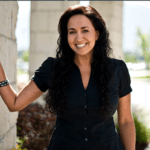 Amy Rees Anderson is a successful entrepreneur, public speaker, angel investor, author, and philanthropist. Amy is the Managing Partner of REES Capital and is the author of the recently released book What Awesome Looks Like: How To Excel In Business & Life and has been been a contributor to both Forbes and the Huffington Post. Amy is an in-demand keynote speaker and she is a regular guest lecturer at a number of Universities. Prior to founding REES Capital, Amy Rees Anderson was the founder and CEO of MediConnect Global Inc, a healthcare technology company and one of the largest cloud-based health information exchanges. In March 2012, Amy successfully led MediConnect to being acquired by Verisk Analytics (VRSK) for over $377 million. Upon selling her company, Amy founded the IPOP Foundation (In Pursuit of Perfection), a charity focused on helping promote, educate and perpetuate entrepreneurship as a pathway to self-reliance. Amy has been the recipient of a number of prestigious awards which include receiving the prestigious Ernst & Young Entrepreneur of the Year Award, being named CEO of the Year, and being the first women to be named BYUs Entrepreneur of the Year. Amy has been featured on the cover of Inc. Magazine, in The Wall Street Journal, USA Today, Fast Company, Bloomberg, Businessweek and many other national publications as a result of her many accomplishments. In 2015, Amy received an honorary PhD. Amy currently serves on the boards of numerous organizations, including: Governor Herbert’s Advisory Team, Chair of Utah Valley University National Advisory Board for Woodbury School of Business; University of Utah National Advisory Board for David Eccles School of Business, Center for Medical Innovation, and Technology Commercialization Board; Brigham Young University Founders Board and BYU’s Wheatley Institute Ethics Advisory Council; Utah State University Clark Entrepreneur Founders Board; Stella Oaks Foundation Board; and The Hale Center Theater Board.
Amy Rees Anderson is a successful entrepreneur, public speaker, angel investor, author, and philanthropist. Amy is the Managing Partner of REES Capital and is the author of the recently released book What Awesome Looks Like: How To Excel In Business & Life and has been been a contributor to both Forbes and the Huffington Post. Amy is an in-demand keynote speaker and she is a regular guest lecturer at a number of Universities. Prior to founding REES Capital, Amy Rees Anderson was the founder and CEO of MediConnect Global Inc, a healthcare technology company and one of the largest cloud-based health information exchanges. In March 2012, Amy successfully led MediConnect to being acquired by Verisk Analytics (VRSK) for over $377 million. Upon selling her company, Amy founded the IPOP Foundation (In Pursuit of Perfection), a charity focused on helping promote, educate and perpetuate entrepreneurship as a pathway to self-reliance. Amy has been the recipient of a number of prestigious awards which include receiving the prestigious Ernst & Young Entrepreneur of the Year Award, being named CEO of the Year, and being the first women to be named BYUs Entrepreneur of the Year. Amy has been featured on the cover of Inc. Magazine, in The Wall Street Journal, USA Today, Fast Company, Bloomberg, Businessweek and many other national publications as a result of her many accomplishments. In 2015, Amy received an honorary PhD. Amy currently serves on the boards of numerous organizations, including: Governor Herbert’s Advisory Team, Chair of Utah Valley University National Advisory Board for Woodbury School of Business; University of Utah National Advisory Board for David Eccles School of Business, Center for Medical Innovation, and Technology Commercialization Board; Brigham Young University Founders Board and BYU’s Wheatley Institute Ethics Advisory Council; Utah State University Clark Entrepreneur Founders Board; Stella Oaks Foundation Board; and The Hale Center Theater Board.
